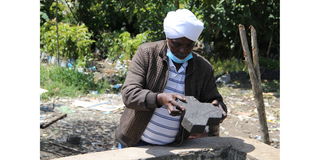Man turns used face masks, plastics into building blocks

Environmentalist Francis Thuti produces cabros and building blocks from face masks, plastic bottles, glass bottles, polythene papers and woven carrier bags.
Since the onset of the Covid-19 pandemic last year, the World Health Organization (WHO) recommended wearing face masks in public as one of the measures of curbing the spread of the disease globally.
The face masks have, however, become a nuisance since most are discarded recklessly in towns and rivers.
But for Francis Thuti, an environmentalist, the dumped protective masks have turned out to be one of the key components in his project of manufacturing interlocking road cabros and building blocks.
Despite the stench emanating from the main Nanyuki dumpsite, Mr Thuti has established a workshop there where he has for the last 10 years conducted ground breaking research on how to conduct a zero-waste project.
Mr Thuti is the chairman of Storm Water and Environmental Management Forum.
On weekdays, you will find Mr Thuti busy sorting out heaps of stinking garbage at his workshop and extracting used face masks, plastic bottles, glass bottles, polythene papers and woven carrier bags.
The government banned plastic carrier bags because they polluted the environment and clogged up drainage systems, hence, contributing to floods during rainy seasons.
Environmentalist Francis Thuti showcases the products he has manufactured at his workshop at Nanyuki dumpsite.
Mr Thuti crushes glass bottles into sand form using an improvised crushing machine and pieces up together all sorts of plastic products including the non-recyclable heavy-duty ones that take a lot of years to biodegrade.
He combines the waste items and heats them at a high temperature of between 360 to 420 degrees Celsius.
A catalyst and the glass sand are added to precipitate the merging of the components.
The product is then condensed to produce heavy-duty blocks, which can be used as either cabro or building blocks.
“During this Covid-19 pandemic, there are lots of face masks lying around and I heard people say that they cannot be recycled. I have changed that perception,” Mr Thuti says.
“A piece of square meter cabro weighs 2.5 kilogrammes. I have used the cabro blocks to cover a walkway of 50 meters at Nanyuki Water and Sewerage Company (Nawasco) offices. This is just a starter of my innovation and they look magnificent and durable,” he adds.
Face masks are one of the key components in his project of manufacturing interlocking road cabros and building blocks.
Exact weight
Using the same ingredients, the environmentalist produces interlocking building blocks, which are currently in the prototype stage before venturing into their mass production.
“I will also conduct research to determine the exact weight of ingredients used to manufacture a piece of a building block. Once fully operational, this will be a win-win situation to the conservation environment even as we construct our roads and houses,” Mr Thuti says.
The material testing and research division in the Ministry of Transport, Infrastructure, Housing, Urban Development and Public Works conducted tests on the products and produced a laboratory test report.
Nyeri regional materials officer Benard Kimeli, in a document dated March 16, 2021, showed the test results on the cabros made from recycled wastes for walkways and parking lots.
Mr Thuti looks forward to expanding his plant at the dumpsite and creating over 200 jobs for youths in the production chain.
“I will soon require more staff to sort out wastes in the dumpsites in the urban centres, hotels, hospitals, ranches and markets. The manufacturing process will also require lots of manpower during mass production. We estimate to bring 200 people on board,” he says.

Environmentalist Francis Thuti burns face masks, plastic bottles, glass bottles, polythene papers and woven carrier bags at his workshop at Nanyuki dumpsite.
Mr Thuti is appealing to the government to inject more funds to boost environmental research and offer technical support.
“We lack technical backup and funds to drive intense research on conservation. For instance, this research has taken me 10 years with the meagre resources that I have. The government should help us with research funds,” Mr Thuti says.
“We need technical back up from experts in our universities who are teaching environmental science. Researchers and professors must come down here because their expertise is required to boost the zero-waste project,” he adds.
Mr Thuti is gearing towards expanding the project to other counties in Kenya.





